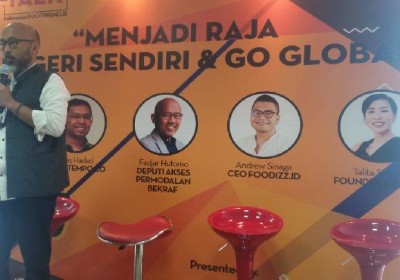No Cooking Skills Required, the Crispy Culinary Business Creates 7.5 Million Workers
March 25, 2019
Deputy Chairman of Financial Access, Indonesian Agency for Creative Economy (Bekraf), Fadjar Utomo (Source: Tempo.co)
“There are 16.9 million creative economy workers. The ones engaged in the culinary sector are also quite significant, around 7.5 million people,” said Fadjar, opening the discussion of “Becoming Kings in Your Own Country and Going Global”, held by Tempo.co, on mid-March 2019.
The Deputy for Access to Capital of the Creative Economy Agency (Bekraf) said that 42 percent contribution for the creative economy comes from the culinary sector. The creative economy is the second largest contributor to Indonesia’s Gross Domestic Product (GDP) after oil and gas. Based on Bekraf data, the GDP from the creative economy reaches IDR 1.100 trillion.
Fadjar stated that the culinary business is an inclusive industry. Anyone can enter this field, starting from micro to large businesses. Fadjar went on to mention that the culinary business is the strongest industry against economic crisis, like the one in 1998.
Currently, culinary business is beginning to attract the eyes of investors, competing with digital application startups. The reason, explained Fajar, is that the return on investment for the culinary business is faster than application-based startups.
“Therefore, Bekraf has created a program called Food Startup Indonesia,” said Fadjar.
After digital technology flourishes, the culinary business continues to grow. Now, housewives no longer need to get out of their homes or own a food stall to have a food business. They only need to rely on stoves or other cooking wares, along with a digital application.
Having said that, Fadjar continued, culinary business in Indonesia is only ranked third among creative economy exports, after fashion and craft. Fadjar argues there are five challenges to address so that culinary can go global, namely service product standardisation, regulation, business capacity development, funding, and ecosystem.
“Culinary entrepreneurs must ensure that their product quality, service, operations, and food serving are top notch from time to time, from one stall to the other. That is why businesses need to create a standard,” Fadjar said.
Addressing another hindrance, Fadjar elaborated that the government is striving to reduce impeding regulations so that culinary business can spread its wings. Bekraf also endeavoured for a National Interest Account (NIA) or national export program funded by the government. From here, culinary entrepreneurs will receive financing and networking aid, strengthening the food business ecosystem.
Chief Executive Officer of Foodizz.id – a startup business facilitating culinary entrepreneurs to upgrade their businesses and expand to the global market -- Andrew Sinaga, said that there are three issues preventing the culinary business from growing. These challenges include constantly increasing operational cost, such as renting or leasing, licensing issue, and difficulty in obtaining capital funding.
“This is because many people enter the culinary business just for the sake of trying, without strong knowledge and network,” said Andrew.
In response, Andrew examines that businesses need solutions in the form of access to learning information, relationships with experts in the culinary business, and enabling technologies. Thus, the digital application based startup he created intends to provide these facilities to culinary entrepreneurs.
Don’t Need to be a Good Cook, Don’t Worry of Being Copied
Director of Tempo Inti Media, Toriq Hadad, said that the culinary business is a sustainable business, provided we have strong knowledge, network, and capital. Toriq suggested that culinary businesses focus on youth, like the founder of Cipta Rasa Prima Group, Rex Marindo, with brands such as Warunk Upnormal and Bakso Boedjangan.
“Because young people have a more long-lasting buying power than older people,” said Toriq.
Rex revealed his key to success with regards to targeting a younger market for his culinary products. He recommends entrepreneurs to look into the target market and available services. When he opened Warunk Upnormal, Rex saw the needs of young people, like hanging out with WiFi and power outlets, things that have not been provided by traditional coffee stalls, while modern ones are too expensive.
Rex emphasised the importance of the knowledge to examine the market and creating business distinction for culinary entrepreneurs. He said that the culinary business owners do not necessarily have to be cooking experts.
“Cooking skill is important, but it does not mean that you have to do it. Other people can do that. It is better if you focus on business development,” said Rex, answering questions from talk show participants.
Another tip was given by the owner of Beau bread business, Talita Setyadi. She urged culinary owners to stop worrying about people, even former workers, copying their products. Talita suggested that entrepreneurs focus more on creating new product innovations and maintaining quality.
“Focus on innovation, and copycats will not be able to follow,” said Talita.
Talita suggested that culinary entrepreneurs expand to new networks and listen to inputs and the needs of the consumers. Because of this, within four years, Beau has successfully supplied bread to more than 100 cafe and restaurants in Indonesia.
Culinary business is proven to create jobs and foster an inclusive economy. This solution and good practice will be discussed in the international forum called Indonesia Development Forum, which will be held on July 22-23, 2019, with the theme: “Mission Possible: Seizing the Opportunities of Future Work to Drive Inclusive Growth”. Send your ideas now!**
Indonesia’s Research Institutions Supporting the Development of the Electric Vehicle Industry
Indonesian Muslim Fashion and Cosmetics IKMs Shine at Dubai World Expo 2020
Govt Steps Up UMKM Transformation Efforts in the Midst of Pandemic Slowdown
Govt Encourages Promotion of IKM Products in Digital Era
Government Begins Developing Maritime Training Center in Makassar
Tweets by IDDevForum
